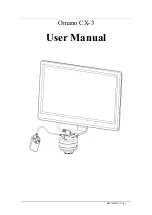
73
Routine Maintenance
Calibration Introduction
The Multi-PID 2 must be calibrated in order to display concentration
in ppm units equivalent to the calibration gas. First, a supply of zero
air, which contains no ionizable gases or vapors, is used to set the
Multi-PID 2’s zero point. Then, a calibration gas, containing a known
concentration of a photoionizable gas or vapor, is used to set the sen-
sitivity.
Clean indoor ambient air may be substituted for a cylinder of zero air.
Due to the Multi-PID 2’s sensitivity, outdoor air is usually unsuitable
for calibration unless the activated charcoal filter (Part No.
CH 24 101) and filter tube holder (Part No. 83 19 093) is used.
Commercially sourced zero air should not have more than 0.1 ppm
total hydrocarbons (THC).
To determine the TLV of the compounds contained in the calibration
gas, refer to the Material Safety Data Sheet (MSDS) supplied with
your calibration gas cylinder.
NOTE:
Disconnect the Multi-PID 2 from the AC adapter before begin-
ning calibration.
NOTE:
In the case of calibration or when changing the configuration,
the data logger has to be deleted manually to ensure consistant
data.
Summary of Contents for Multi-PID 2
Page 7: ...7 Notices and Warnings Notices and Warnings...
Page 14: ...14 Notices and Warnings...
Page 15: ...15 Introduction Introduction...
Page 25: ...25 Using the Multi PID 2 Using the Multi PID 2...
Page 42: ...42 Using the Multi PID 2...
Page 43: ...43 Connecting Accessories Connecting Accessories...
Page 52: ...52 Connecting Accessories...
Page 53: ...53 Menu Functions Menu Functions...
Page 71: ...71 Routine Maintenance Routine Maintenance...
Page 86: ...86 Routine Maintenance...
Page 87: ...87 Troubleshooting Troubleshooting...
Page 93: ...93 Appendices Appendices...
Page 104: ...104 Appendices...
















































